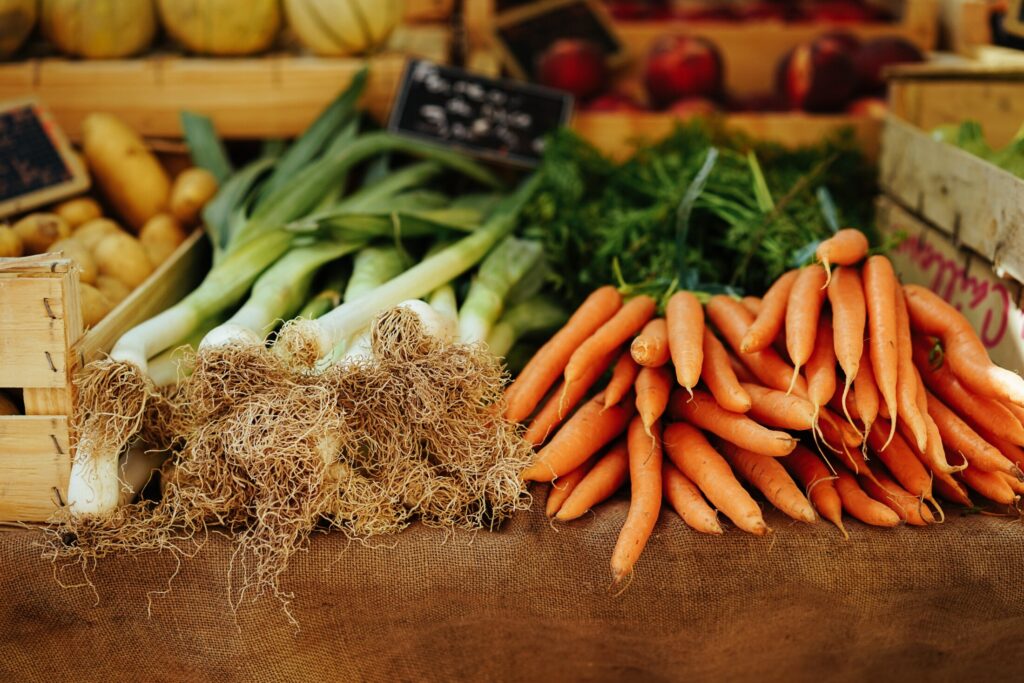RDAMNC acknowledges that the Norfolk Island community has been working tirelessly to adapt to the new ban on importation of live ruminants. We acknowledge that NI has undertaken – at significant cost – projects to upskill in artificial reproduction, but the projects are not delivering results that are assisting the situation.
RDA MNC and NI is seeking a research partner to assist with the following project objectives:
- Design the lowest risk possible protocol for an emergency live animal importation onto Norfolk Island backed by scientific evidence that specifically addresses the following:
- Testing regime
- Quarantine regime – mainland and Norfolk Island
- Potential breeders/commercial suppliers
- Cost
- Design a testing protocol for Live Embryos which will satisfy the Biosecurity testing requirements for Johnes and Q-Fever (both male and female donors tested) OR a sacrificial embryo testing protocol (and validate the testing of embryos to as satisfactory for testing for Biosecurity purposes)
- Provide the live embryos under a commercial arrangement if breeding suitable stock
- Assist in investigating the reasons for low success rates from artificial insemination and work with the Norfolk Island community to improve these success rates
RDAMNC will continue to provide updates below.
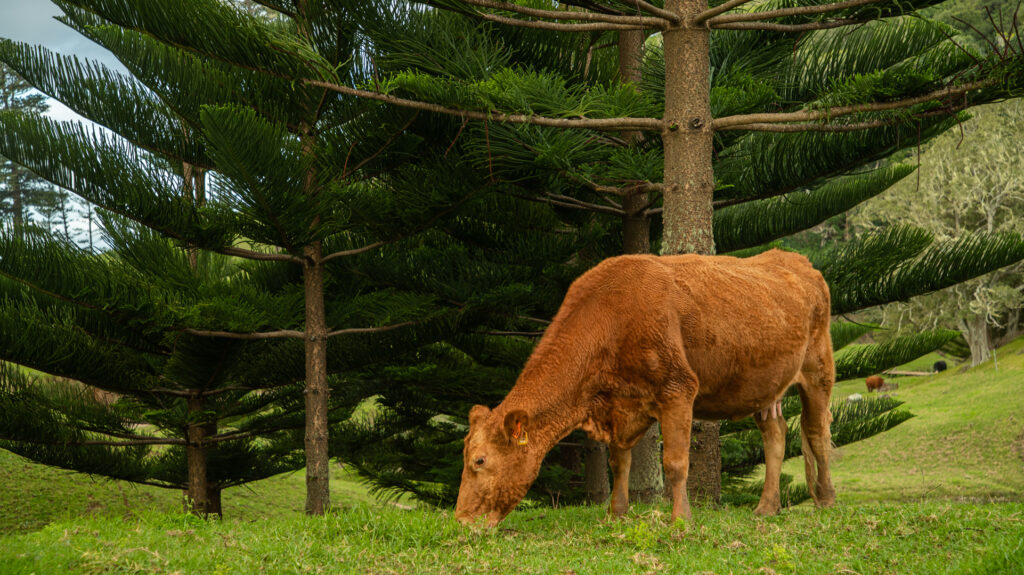
UPDATE 06/05/2024.
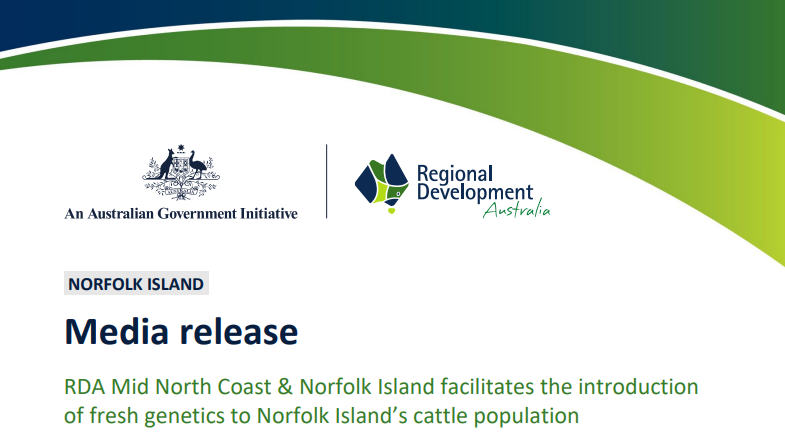
We are very pleased to announce that we have been able to facilitate the introduction of an assisted reproduction program for the cattle on Norfolk Island. We’d like to thank the Hon. Kristy McBain, MP and the Department of Infrastructure, Transport, Regional Development, Communication and the Arts, Breeder Genetics, Norfolk Island Cattle Association and the Norfolk Island Regional Council for making this possible.
A full copy of the media release can be viewed here.
UPDATE 28/06/2024
Regional Development Mid North Coast and Norfolk Island (RDAMNC & NI) are thrilled to announce that the first stage of the embryo transfer and artificial insemination program has been successfully completed on Norfolk Island with just over 40 cows receiving an embryo transfer and 30 cows being artificially inseminated.
RDAMNC & NI would like to thank and acknowledge the hard work of everyone involved in getting the first stage of the program successfully delivered. In particular, thanks go to Breeder Genetics and Holbrook Breeders Australia for their technical expertise and time, and locally, special thanks to Candice and the members of the Norfolk Island Cattle Association (NICA) who worked tirelessly in the lead up to this week.
Breeder Genetics and Holbrook Breeders Australia will be back on Norfolk Island in September for the second round of insemination and hopefully, at that time, RDAMNC & NI will also be able to share the good news that there are some viable pregnancies from this first round. A more in-depth story to follow in the coming weeks so stay tuned.
“RDAMNC & NI has seen and heard the devastation and frustration from the Norfolk Island community at the challenges they have faced since the change of legislation in 2015, and the economic impact the inability to import live ruminants has caused. We are hopeful that this program is successful and there are some beautiful calves born on Norfolk Island next year and the cattle industry on Norfolk Island can begin to rebuild. To see the first round of the program come to fruition this week is fantastic and we are very excited for round two in September. This whole process has required collaboration and teamwork from a number of parties and RDA is very grateful to be a part of the team that has pulled it all together”, stated Dianne Wall, Acting CEO, RDAMNC & NI.
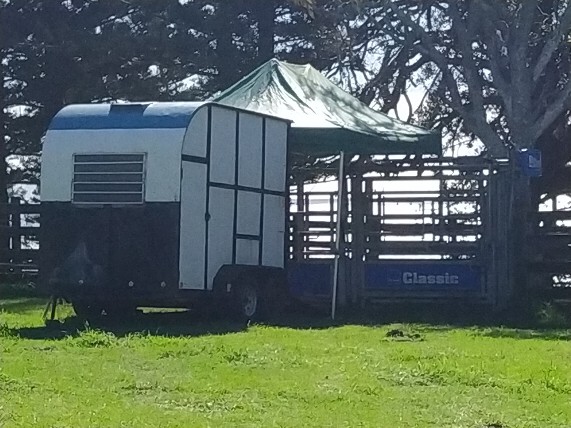
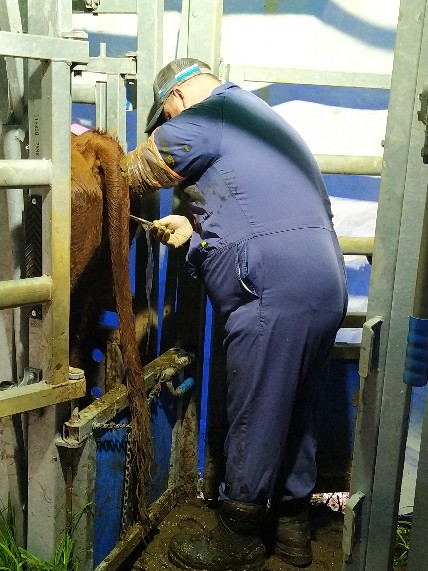
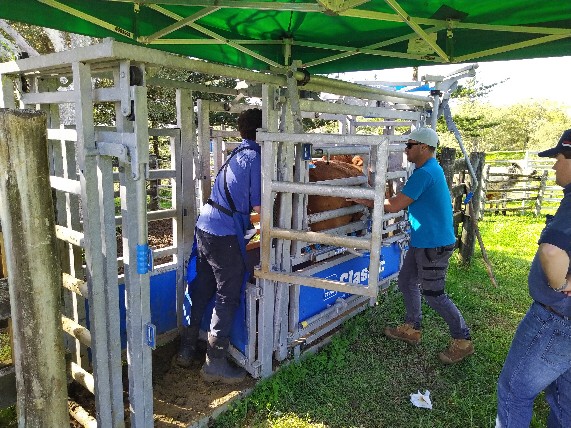
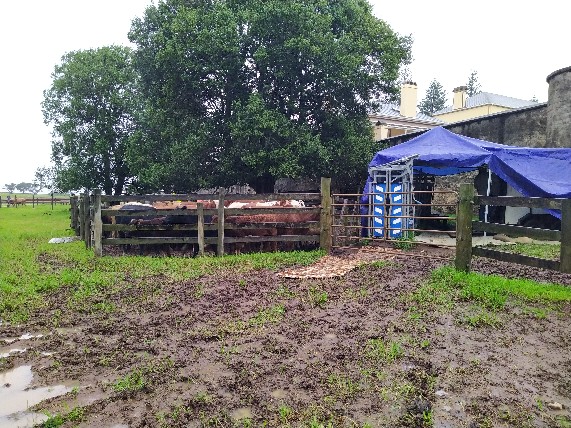
Update 29/11/2024
Regional Development Australia Mid North Coast (RDA MNC) has partnered with stakeholders to implement the Assisted Reproductive Program (ARP) on Norfolk Island, which launched in June 2024. The first stage of the program has been a success, with over 40 cows receiving embryo transfers and 30 cows undergoing artificial insemination. The program achieved a promising 65% success rate for embryo transfers and 40% for artificial insemination, offering hope for revitalising the island’s cattle industry. RDA MNC extends thanks to Breeder Genetics, Holbrook Breeders Australia, and the Norfolk Island Cattle Association for their expertise, as well as local community members, for their hard work.
Looking ahead, RDA MNC and Norfolk Island are seeking research partners to further develop protocols for live animal importation, testing of embryos, and investigating ways to improve artificial insemination success rates. By the end of 2024, RDA MNC plans to continue refining these techniques and share results of the ongoing embryo transfers. In 2025, the program will expand to include further collaboration on breeding protocols and strengthening the island’s agricultural sustainability for the long term. The ARP is a crucial step towards restoring the cattle industry and ensuring Norfolk Island’s agricultural future.
Read the full media release here.
Norfolk Island Cattle Industry Secures a Sustainable Future
Regional Development Australia Mid North Coast (RDAMNC) is pleased to announce the successful completion of Norfolk Island’s first Assisted Reproductive Program (ARP) for the cattle industry. After years of dedicated effort and collaboration, the program has achieved its key objectives and laid a strong foundation for the long-term sustainability of the island’s cattle herd.
With 21 new calves born, this landmark initiative has revitalised local breeding capacity and demonstrated the strength of collective action. RDAMNC acknowledges the significant contributions of Breeder Genetics, Holbrook Breeders Australia, the Norfolk Island Cattle Association, the Department of Infrastructure, Transport, Regional Development, Communications and the Arts, and the Norfolk Island Regional Council.
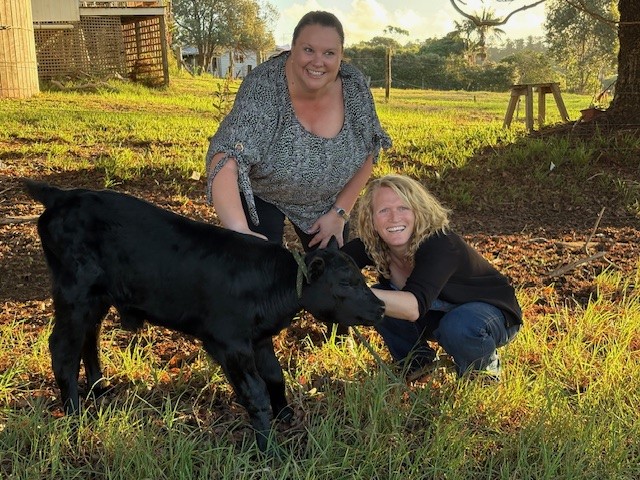
Dr Madeleine Lawler shared:
“I first started visiting Norfolk Island in 2023. By then, the Islanders had faced every roadblock imaginable and the consequences for cattle health were visible around the Island… The cattle association took a big leap of faith and put enormous amounts of effort into the project.”
This program marks a turning point for agriculture on Norfolk Island. RDAMNC looks forward to building on this momentum, particularly through future work with the island’s sheep industry, and continuing the cycle of sustainability, resilience and genetic diversity.
Please refer to the official media release HERE.
Updated 14/05/2025

